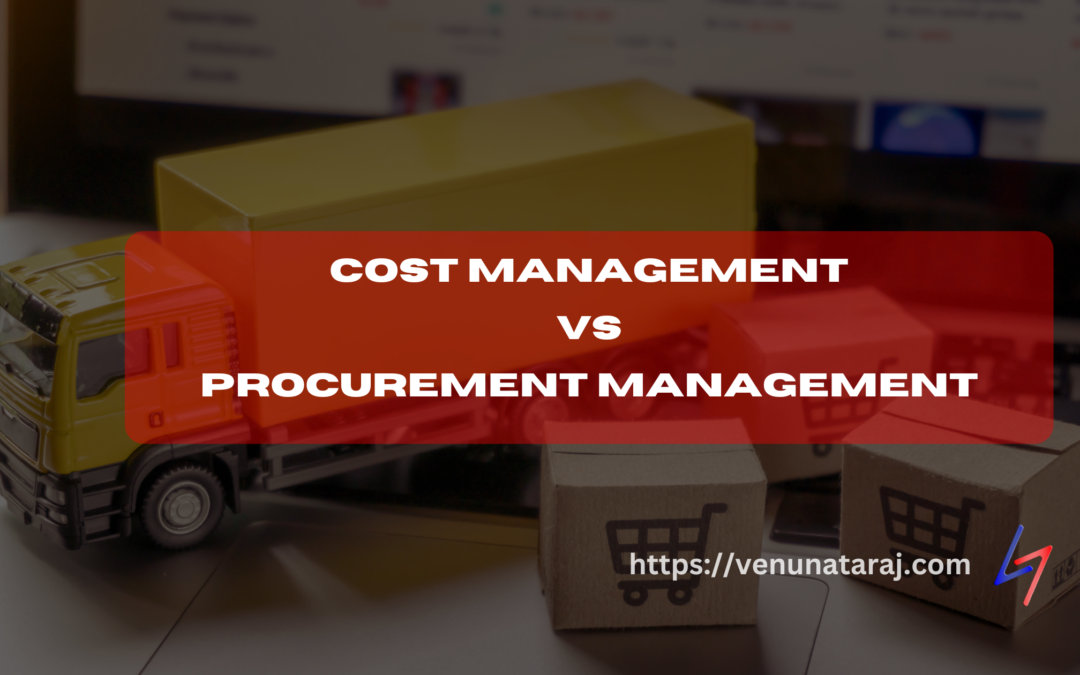Table of Contents
Cost Management vs. Procurement Management: Key Differences and Their Impact on Project Success
In the world of project management, two critical processes often work hand in hand to ensure project success: Cost Management and Procurement Management. While both are essential, they serve different purposes and involve distinct activities. This article will compare and contrast these two processes and explore how they contribute to project success.
Understanding Cost Management
Cost Management is a crucial aspect of project management that focuses on planning, estimating, budgeting, and controlling costs throughout the project lifecycle.
Definition of Cost Management
Cost Management is the process of planning and controlling the budget of a project. It involves estimating, allocating, and controlling costs to ensure that the project is completed within the approved budget.
Key Components of Cost Management
1. Cost Estimation
Cost estimation is the process of predicting the quantity, cost, and price of resources required to complete a project. This involves:
- Analyzing historical data
- Using estimation techniques (e.g., analogous, parametric, bottom-up)
- Considering project scope and requirements
2. Budgeting
Budgeting involves allocating the overall cost estimate to individual work items to establish a cost baseline. This process includes:
- Creating a detailed project budget
- Allocating funds to different project phases or work packages
- Setting up cost accounts
3. Cost Control
Cost control is the process of monitoring, managing, and controlling project costs throughout its lifecycle. This involves:
- Tracking actual costs against the budget
- Analyzing cost variances
- Implementing corrective actions when necessary
- Updating the cost baseline as needed
Understanding Procurement Management
Procurement Management focuses on acquiring goods and services from external sources to complete project objectives.
Definition of Procurement Management
Procurement Management is the process of identifying, selecting, and managing suppliers to acquire necessary products or services for project completion.
Key Components of Procurement Management
1. Procurement Planning
Procurement planning involves determining what to procure, how to procure it, and when. This includes:
- Identifying project needs that require external resources
- Developing a procurement strategy
- Creating a procurement management plan
2. Conducting Procurements
This phase involves executing the procurement plan by:
- Issuing requests for proposals (RFPs) or quotations
- Evaluating vendor responses
- Negotiating contracts
- Awarding contracts to selected vendors
3. Procurement Control
Procurement control involves managing relationships with vendors and ensuring they meet contractual obligations. This includes:
- Monitoring vendor performance
- Managing changes to contracts
- Closing out contracts upon completion
Comparing Cost Management and Procurement Management
While both processes are crucial for project success, they differ in several key aspects:
1. Focus
- Cost Management focuses on overall project costs, including internal and external expenses.
- Procurement Management specifically deals with acquiring goods and services from external sources.
2. Scope
- Cost Management covers the entire project lifecycle and all project expenses.
- Procurement Management is limited to external acquisitions and vendor relationships.
3. Primary Activities
- Cost Management involves estimating, budgeting, and controlling costs.
- Procurement Management involves planning purchases, selecting vendors, and managing contracts.
4. Stakeholders
- Cost Management primarily involves internal stakeholders like project team members and finance departments.
- Procurement Management often involves external stakeholders such as vendors and suppliers.
How Cost Management and Procurement Management Contribute to Project Success
Both Cost Management and Procurement Management play crucial roles in ensuring project success. Here’s how they contribute:
1. Cost Optimization
Cost Management:
- Ensures efficient use of project resources
- Helps identify cost-saving opportunities
- Allows for better financial decision-making
Procurement Management:
- Enables competitive pricing through vendor selection
- Helps negotiate favorable terms and conditions
- Allows for bulk purchasing discounts
By working together, these processes help optimize overall project costs, increasing the likelihood of completing the project within budget.
2. Timely Procurement of Resources
Cost Management:
- Provides a clear understanding of budget constraints
- Helps prioritize resource allocation
Procurement Management:
- Ensures timely acquisition of necessary goods and services
- Manages vendor relationships to meet project timelines
The combination of these processes ensures that resources are available when needed, preventing delays and keeping the project on schedule.
3. Risk Mitigation
Cost Management:
- Identifies potential cost overruns early
- Allows for proactive cost control measures
Procurement Management:
- Reduces risks associated with vendor performance
- Provides contractual safeguards against delivery issues
Together, these processes help identify and mitigate various project risks, contributing to smoother project execution.
Synergy Between Cost Management and Procurement Management
While distinct, Cost Management and Procurement Management often work in tandem:
- Informed Decision-Making: Cost estimates from the Cost Management process inform procurement decisions, helping choose between make-or-buy options.
- Budget Alignment: Procurement activities are guided by the budget established through Cost Management, ensuring purchases align with financial constraints.
- Performance Monitoring: Cost control activities often rely on data from procurement processes to track expenses related to external acquisitions.
- Contract Negotiations: Cost Management provides valuable input for contract negotiations in the Procurement Management process.
Conclusion
Cost Management and Procurement Management are two essential processes that significantly contribute to project success. While Cost Management focuses on overall project finances, including estimation, budgeting, and control, Procurement Management deals specifically with acquiring external resources and managing vendor relationships.
These processes work together to optimize costs, ensure timely resource availability, and mitigate risks. By effectively implementing both Cost Management and Procurement Management, project managers can:
- Keep projects within budget
- Acquire necessary resources efficiently
- Reduce financial and procurement-related risks
- Make informed decisions about resource allocation
- Improve overall project performance
Understanding the differences and synergies between these processes allows project managers to leverage them effectively, ultimately increasing the chances of project success. As projects become increasingly complex and resource-dependent, mastering both Cost Management and Procurement Management becomes crucial for any project manager aiming for consistent success in their endeavors.
Additional Reads:
Cost Estimation: A Comprehensive Overview
Procurement Management

